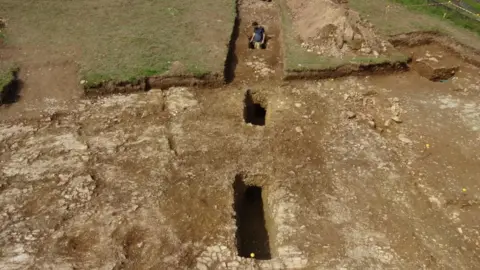Calstock Roman dig reveals 'unexpected' mine
 University of Exeter
University of ExeterArchaeologists digging near a Roman fort in Cornwall have unearthed remains of a mine and a Roman road.
The discoveries were made during a new dig near a fort found at Calstock in 2007, one of only three such sites known in the county.
Experts will carry out further analysis of a previously-unknown series of deep pits, connected by arched tunnels.
Dig leader Dr Chris Smart, from the University of Exeter, said the mine was an "unexpected bonus".

Excavations this year have focused on the west gate at the front of the fort.
The excavation has revealed a "rare glimpse" of timber-built Roman military buildings, as well as rubbish and cesspits.
 University of Exeter
University of ExeterDr Smart led a team of students and local volunteers including refugees and asylum-seekers based in Plymouth.
He said the only other Roman forts discovered in Cornwall are at Nanstallon, near Bodmin, and near Restormel Castle.
Romans left few marks of their presence in the county and it is thought fewer than 1,000 soldiers were based there.
Next year the team hopes to unearth more detail of the Romans in Cornwall with a dig inside the fort, the first of its kind since the 1970s.

"It looks as if there were about 500 soldiers based at Calstock, so this is an unprecedented opportunity," said Dr Smart.
Further digs are planned in 2021, funded by the National Lottery Heritage Fund as part of the wider Understanding Landscapes project.
Calstock fort was discovered in 2007 as part of an earlier University of Exeter project to investigate medieval silver mining in Bere Ferrers, on the opposite side of the River Tamar in Devon.
